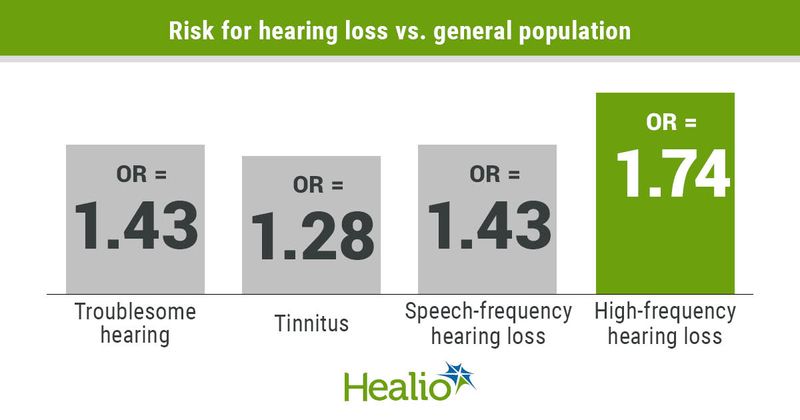Published by:
Wang Q, et al.JAMAOtolaryngolHead Neck Surg. 2023;doi:10.1001/jamaoto.2023.2941
Cancer survivors at significantly higher risk for hearing loss
Published by:
Wang Q, et al.JAMAOtolaryngolHead Neck Surg. 2023;doi:10.1001/jamaoto.2023.2941
Click Here to Manage Email Alerts
Key takeaways:
- A two-question screening process can help identify cancer survivors with true hearing loss.
- Cancer survivors exhibit higher rates of multiple forms of hearing loss compared with the general population.
Cancer survivors have a significantly higher prevalence of both self-reported and audiometry-confirmed hearing loss than the general population, according to data published inJAMA Otolaryngology-Head & Neck Surgery.
The findings confirm data published in prior studies, according to researchers.

“We expected that cancer survivors would have a higher burden of hearing loss — but [we] are still surprised to see that 40% of cancer survivors reported troublesome hearing and had audiometry confirmed speech-frequency [hearing loss],”Qian Wang, MD, MPH,assistant professor at Case Western Reserve University School of Medicine, told Healio.
“More importantly, we are very surprised to see that by asking two simple questions ... we are able to accurately identify those who have audiometry-confirmed [hearing loss],” she added. “This could serve as a very effective screening tool for health care providers.”
Background and methodology
Cancer survivors have an elevated risk for developinghearing loss——由于年龄和公关的晚期效应evious treatment, including chemotherapy and radiotherapy — but limited data exist regarding the prevalence of hearing loss among cancer survivors within the United States.
Researchers conducted a cross-sectional study to estimate the prevalence of subjective and objective hearing loss via audiometry testing among both cancer survivors and the general population.
The study included 9,337 adults (median age, 47.4 years; 51.2% women)who had audiometry testing and responded to a hearing questionnaire from the National Health and Nutrition Examination Survey (2011-2012, 2015-2016 and 2017–March 2020 prepandemic study cycles).
Of the study population, 848 participants (10.3%) survived a cancer diagnosis.
Researchers calculated the weighted prevalence of subjective hearing loss and objective hearing loss as the study’s primary outcome measurements.
Results
Cancer survivorshad a higher prevalence of troublesome hearing (adjusted OR = 1.43; 95% CI, 1.11–1.84), tinnitus (adjusted OR = 1.28; 95% CI, 0.94–1.74), speech-frequency hearing loss (adjusted OR = 1.43; 95% CI, 1.11–1.85) and high-frequency hearing loss (adjusted OR = 1.74; 95% CI, 1.29–2.34) compared with the general population.
“Half of cancer survivors 65 years old [and older] report having trouble with their hearing; 63% of cancer survivors were found to have audiometry-confirmed high-frequency hearing loss, which was 1.74 times higher than the general population,” Wang said.
Using a subjective hearing loss tool and questioning regarding whether study participants had endured troublesome hearing and/or tinnitus in screening for hearing loss, investigators reported a age-and gender-adjusted area under the curve of 0.88 for detecting speech-frequency hearing loss and 0.9 for detecting high-frequency hearing loss.
Next steps
The findings of this study show that cancer survivors exhibit significantly higher rates of hearing loss than the general population, with a two-question screening process that includes asking such individuals if they have trouble hearing in general or have tinnitus, helping accurately identify people who may have audiometry-confirmed hearing loss.
“Cancer survivors have a significantly higher prevalence of hearing loss than individuals without a history of cancer,” Wang told Healio. “Health care providers, including oncologists, primary care physicians and geriatricians, should raise awareness. By asking two simple questions — troublesome hearing and tinnitus — we can potentially accurately identify those patients who have hearing loss and provide them early referral and intervention.”
Additionally, researchers noted that recent FDA approvals late last year have improved convenience for cancer survivors struggling with potential hearing loss.
“The U.S. FDA established the availability of over-the-counter hearing aids that adults with mild to moderate hearing loss may purchase without the need for a medical examination, prescription, or fitting adjustment by an audiologist,” Wang said. “This may further improve accessibility and affordability among cancer survivors to improve their hearing and mitigate potential adverse effects of hearing loss.”
For more information:
Qian Wang, MD, MPH,can be contacted at qian.wang@uhhospitals.org.

 Read next
Read next